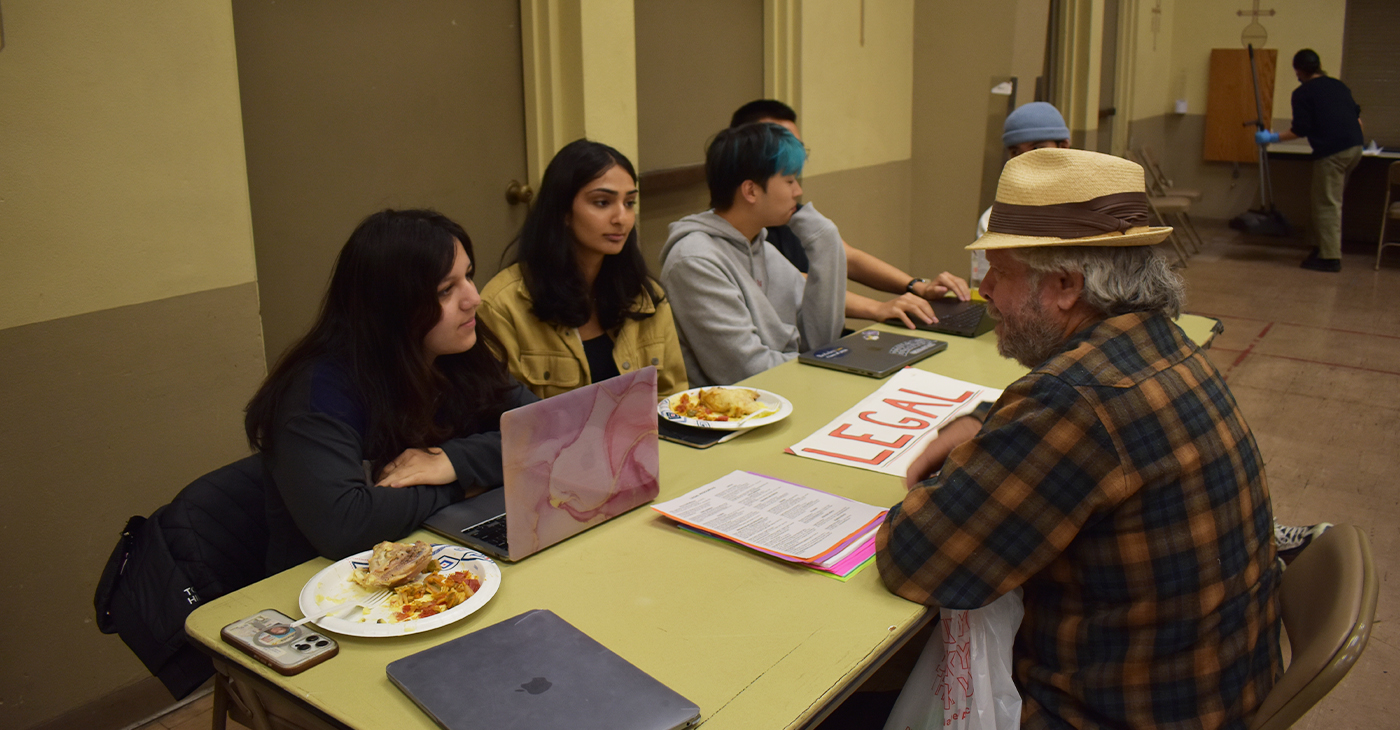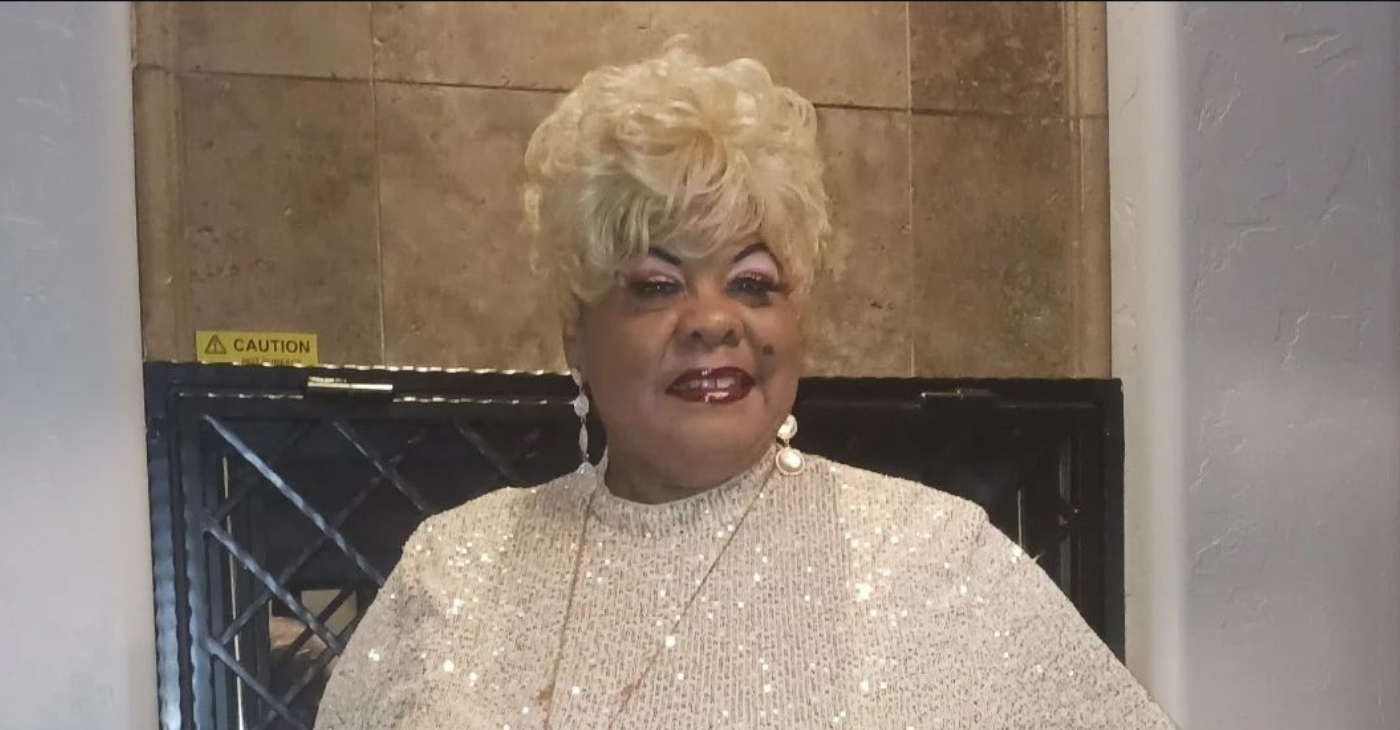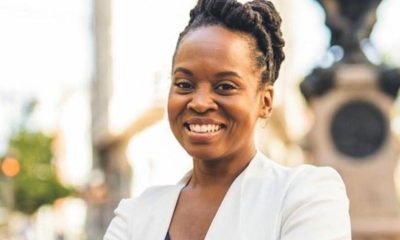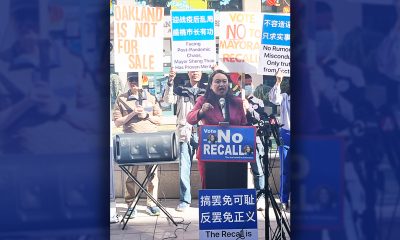Bay Area
Libby Schaaf, Associates Stiff Penalties for ‘Serious’ Campaign Violations in 2018, 2020 City Elections
According to the proposed settlement agreements, which are on the agenda for the Monday, Sept. 16 Public Ethics Commission (PEC), Schaaf and many of those with whom she was working, have cooperated with the investigation and have accepted the commission’s findings and penalties. “Respondents knowingly and voluntarily waive all procedural rights under the Oakland City Charter, Oakland Municipal Code, the Public Ethics Commission Complaint Procedures, and all other sources of (applicable) procedural rights,” the settlement agreement said.

Ex-Mayor, Metropolitan Chamber of Commerce Are Not Disputing Findings of Violations
By Ken Epstein
Former Oakland Mayor Libby Schaaf, currently a candidate for state treasurer, faces thousands of dollars in penalties from the City of Oakland Public Ethics Commission for a “pattern” of serious campaign violations in 2018 and 2020 city elections
According to the proposed settlement agreements, which are on the agenda for the Monday, Sept. 16 Public Ethics Commission (PEC), Schaaf and many of those with whom she was working, have cooperated with the investigation and have accepted the commission’s findings and penalties.
“Respondents knowingly and voluntarily waive all procedural rights under the Oakland City Charter, Oakland Municipal Code, the Public Ethics Commission Complaint Procedures, and all other sources of (applicable) procedural rights,” the settlement agreement said.
“If respondents fail to comply with the terms of this stipulation, then the commission may reopen this matter and prosecute respondents to the full extent permitted by law,” according to the agreement.
Schaff and co-respondents were involved in three related cases investigated by the PEC:
In the first case, Schaaf in 2018, without publicly revealing her involvement as required by law, working with the Oakland Metropolitan Chamber of Commerce and others, created, lead, and raised funds for a campaign committee called “Oaklanders for Responsible Leadership, Opposing Desley Brooks for Oakland City Council.”
The “respondents,” who were responsible for the violations in this case were: the campaign committee called Oaklanders for Responsible Leadership; Mayor Schaaf; the Oakland Metropolitan Chamber of Commerce; OAKPAC; which is the chamber’s political action committee; Barbara Leslie and Robert Zachary Wasserman, both leaders of the Oakland chamber; and Doug Linney, a campaign consultant who was brought on by Schaaf to organize and lead the campaign to defeat Desley Brooks in her 2018 campaign for reelection.
Linney reported in his interview with the PEC that Schaaf had approached him and said, “Let’s do an Independent Expenditure (IE) campaign against Desley and let me see if I can get some other folks involved to make it happen.”
Linney developed a plan, which hired staff to organize field canvassing and phone banking. He said Schaaf told him the budget should be more than $200,000 because “I think raising $200K shouldn’t be hard and could shoot for more.”
None of the original group, which met weekly, included anyone who lived in District 6, the section of the city that Brooks represented. They waited to start the committee until they could find a District 6 resident willing to be the face of their campaign.
During her tenure, Brooks was instrumental in establishing the city’s Department of Race and Equity.
Among the violations reported by the PEC:
- Respondents reported contributions as being received from the chamber’s political action committee, OAKPAC, “rather than the true source of the contributions,” in order to hide the identities of contributors.
- Failure to disclose “controlling candidate,” Libby Schaaf, on a mass mailer.
- Failing to disclose the controlling candidate, Libby Schaaf, on official campaign filings.
- Receiving contributions in amounts over the legal limit. For example, the State Building and Construction Trade Council of California PAC donated $10,000, which is $8,400 over the limit; and Libby Schaaf donated $999, which is $199 over the limit.
Total contributions were $108,435, of which $82,035 was over the limit.
“In this case, Mayor Schaaf and her associates’ action were negligent. All of them were fully aware that Mayor Schaaf and significant participation in the IE campaign against Brooks, including its creation, strategy, and budgeting decisions, and selection of personnel.”
Further, the PEC said, “The respondents’ violations in this case are serious. The strict rules applying to candidate-controlled committees go directly to the very purpose of campaign finance law.”
In her interview with the PEC, Schaaf, who is an attorney, had received incorrect legal advice from Linney, her campaign consultant, that her activities were legally permissible, because she was not the “final decision-maker.”
Total recommended penalties for all those involved in this case were $148,523.
The PEC also found violations and is recommending penalties in two other cases.
The second case involves the Oakland Fund for Measure AA in 2018, which established a parcel tax to fund early childhood initiatives in Oakland. Looking into this case, PEC investigators found that Schaaf used her position as mayor to benefit the campaign, though without revealing her involvement.
A contractor who made a large contribution was Julian Orton of Orton Development, which was in negotiations with the city to redevelop the Henry J. Kaiser Convention Center. Orton donated $100,000
Schaaf, for failing to disclose that the campaign committee was “candidate controlled,” may face a $4,500 penalty. For violating the rule against contractor contributions, the campaign committee and Schaaf face a possible $5,000 penalty.
Orton has agreed to pay a $5,000 penalty.
The third case involved a campaign in 2020, the Committee for an Affordable East Bay, which raised thousands of dollars to support Derrick Johnson’s campaign for Councilmember-at-Large position and to attack the incumbent, Councilmember-at-Large Rebecca Kaplan.
Investigators found that Schaaf was extensively and secretly involved in the work of this committee.
She received a $100,000 donation from Lyft, which had a contract with the city at the time and was therefore legally prohibited. Lyft recently agreed to pay a $50,000 fine.
Activism
City of Oakland Celebrates Reopening of Main Library
“Libraries are such critical facilities for all Oaklanders, whether it’s children coming to story-time, adults reading the newspapers or borrowing the latest novels, and people engaging with a range of services and programs that the library hosts,” said Council President and District 2 Councilmember Nikki Fortunato Bas. “Such library services and programs are only possible when the facility’s electricity, heating, roof, and lighting are fixed and running efficiently. I’m proud to join this re-opening of our Main Public Library.”

The branch had been closed since May for critical infrastructure upgrades
Special to the Post
The City of Oakland leadership and community partners gathered to celebrate the reopening of the Main Library after completion of critical infrastructure upgrades to enhance the library’s facilities and provide a better experience for patrons.
Renovations include new roof installation, skylight repair, critical electrical system upgrades, new boiler control system installation, auditorium heating and cooling system installation, and improvements to lighting, flooring and ceilings throughout the building.
“This is truly something to celebrate, the reopening of our wonderful Main Library! I congratulate the staff and our partners for this important project to make the Main Library a more comfortable place for everyone for years to come, said Oakland Mayor Sheng Thao. “Thank you to Oakland voters and the California State Library for making these crucial improvements possible.”
“Libraries are such critical facilities for all Oaklanders, whether it’s children coming to story-time, adults reading the newspapers or borrowing the latest novels, and people engaging with a range of services and programs that the library hosts,” said Council President and District 2 Councilmember Nikki Fortunato Bas. “Such library services and programs are only possible when the facility’s electricity, heating, roof, and lighting are fixed and running efficiently. I’m proud to join this re-opening of our Main Public Library.”
“Public libraries are a wonderful resource for our residents, offering a safe space for learning and being,” said District 3 Councilmember Carroll Fife. “It is critical to improve and modernize our libraries so more members of our community can utilize and enjoy them. I’m excited that the necessary renovations to the Main Library have been completed successfully and thank everyone involved, particularly the City team, who helped secured the necessary grant funds for this work.”
“I am proud of the City staff and project partners who kept this important project on schedule and under budget,” said Assistant City Administrator G. Harold Duffey. “The library is an incredibly important resource for our community members, and this project is an investment into the library’s future.”
“December 2nd was a momentous occasion for Oakland Public Library as we proudly reopened the doors of the Main Library following extensive infrastructure repairs,” said Director of Library Services Jamie Turbak. “Closing the Main Library for six months was no easy decision, as it serves as the central hub for our library system and is truly the heart of Oakland. Yet, this renovation was essential, representing more than just physical upgrades—it reflects our ongoing commitment to creating a safe, welcoming space for everyone.”
The City Administrator Jestin Johnson also attended the press conference and signalled his support for the completion of the record-setting completion of the renovations. Gay Plair Cobb, a newly appointed Library Commissioner said the Library represents the soul and brains of our community.
The Oakland Public Library secured funding for these crititcal repairs through a variety of sources. The California State Library’s Building Forward Library Facilities Improvement Program awarded the Main Branch $4.2 million. To comply with the grant terms, the City of Oakland provided matching funds through Measures KK, as approved by the Oakland City Council in October 2023.
The Main Library will host an Open House to celebrate the reopening on February 22, 2025, 10 a.m. – 5:00 p.m.
About the Oakland Public Library
The Oakland Public Library is a part of the City of Oakland in California and has been in existence since 1878. Locations include 16 neighborhood branches, a Main Library, a Second Start Adult Literacy Program, the Oakland Tool Lending Library, and the African American Museum and Library at Oakland (AAMLO). The Oakland Public Library empowers all people to explore, connect, and grow. Oaklandlibrary.org
Activism
A Student-Run Group Provides Critical Support Services to Underserved Residents
Those visiting The Suitcase Clinic can get legal advice, sign up for food assistance, receive housing resources, get medical help, or enjoy a hot, fresh meal. They can also get haircuts and foot washes from the student volunteers. Nilo Golchini, executive director of the clinic, said one of the goals for most of the students working there is helping bridge the gap of trust that exists between many unhoused people and the healthcare and social welfare systems.

Part One
By Magaly Muñoz
Every Tuesday evening, the dining hall of First Presbyterian Church fills up with dozens of people eating, laughing and moving from table to table, receiving much-needed services from UC Berkeley students – just a few blocks away from the university’s campus.
Individuals seeking support services can be found in this multi-stationed room on the south end of the church talking to law students, student case managers, or receiving medical attention in a corner by healthcare professionals.
This weekly event is hosted by Cal students through a volunteer-run program called The Suitcase Clinic.
The clinic, founded in 1989, was intended to offer free resources to underserved communities in Berkeley and surrounding cities. The majority of the clinic’s clientele are unhoused or low-income people looking for extra support.
Those visiting the clinic can get legal advice, sign up for food assistance, receive housing resources, get medical help, or enjoy a hot, fresh meal. They can also get haircuts and foot washes from the student volunteers.
Nilo Golchini, executive director of the clinic, said one of the goals for most of the students working there is helping bridge the gap of trust that exists between many unhoused people and the healthcare and social welfare systems.
During their tenure in the program, many of the students say they become strong advocates for homelessness rights.

Visitors of the Suitcase Clinic can receive haircuts and foot washing by student volunteers every Tuesday evening. Photo by Magaly Muñoz.
“We’re also standing in solidarity with them. So, it’s not saying, ‘I’m going to help you, but I’m also going to stand with you,’” Golchini said.
Student volunteers get extensive training prior to working directly with clients. Those interested have to take a semester-long class to become versed in areas such as outreach, intersectionality, how to interact with unhoused people, how to sign people up for social services. and more.
Volunteers then get to pick from three different clinics: General, Women’s, or Youth and LGBTQ+.
The General Clinic is the most popular among visiting residents, while Women’s and Youth/LQBTQ+ have more specialized services for attendees.
The Women’s Clinic has many of the similar services to General, but also includes nail painting, childcare, and massages.
The Youth and LGBTQ+ Clinic offers a safe space for young people navigating living on the streets, with services that include housing referrals, wellness and recreation classes and employment resources.
Golchini explained that it’s important for them to keep these clinics separate because the different demographics experience poverty and homelessness differently than those who visit the General Clinic.

Suitcase Clinic student workers posing for a photo with a frequent clinic attendee. The Clinic is open to Berkeley unhoused and low-income residents who need medical or legal service, or a hot meal. Photo by Magaly Muñoz.
“We’re able to provide spaces where people can come in and feel safe and not feel like they’re constantly worried that something’s going to happen to them,” she said.
An outreach team also visits encampments every other Saturday in the Berkeley area to provide hygiene kits and encourage people to visit the in-person clinic, if possible.
However, Golchini said engagement has been low for some time now due to a recent decision by the U.S. Supreme Court that allows cities to ban and cite people for sleeping on the streets.
She said a lot of their clientele got displaced to other cities over time, making it difficult to stay in contact with the services the Clinic was providing for them.
But that hasn’t slowed down the students at the Clinic, if anything, it has pushed them to do more for the community they serve.
Arts and Culture
Promise Marks Performs Songs of Etta James in One-Woman Show, “A Sunday Kind of Love” at the Black Repertory Theater in Berkeley
“The (show) is a fictional story about a character named Etta, aka Lady Peaches,” said Marks. “She falls in love with Johnny Rhythm, leader of the Rhythm Players Band and headliners of Madam G’s Glitta Lounge.” Marks channeled the essence of Etta James, singing favorites such as “Sugar on the Floor” and “At Last.”

Special to the Post
It was “A Sunday Kind of Love” at the Black Repertory Group Theater in Berkeley on Saturday night, Dec. 7. The one-woman musical based on the music of Etta James featured the multi-talented singer Promise Marks
Marks, who wrote and directed the musical, also owns PM Productions.
“The (show) is a fictional story about a character named Etta, aka Lady Peaches,” said Marks. “She falls in love with Johnny Rhythm, leader of the Rhythm Players Band and headliners of Madam G’s Glitta Lounge.”
Marks channeled the essence of Etta James, singing favorites such as “Sugar on the Floor” and “At Last.”
In between her soulful songs, Marks narrated impactful moments of the love story and journey of blues and forgiveness.
Marks sultry voice carried the audience back to an era that echoed with the power of Black music and a time of great change.
Marks said James shared love for the Black community by singing at gatherings during the Civil Rights Movement uplifting the people.
“She spoke to the movement, spoke to the people, and let her music speak for itself,” Marks said.
Backing the musical’s monologues, images and videos of Etta James are projected for the audience to view. While the production is fictional, Marks infused script with the unfairness and heartbreak James experienced while performing.
Marks performed gospel artist Donnie McClurkin’s “We Fall Down” as she narrated acts of reconciliation and forgiveness among the characters at Johnny Rhythm’s deathbed.
Marks, who regularly sings for the Miss America Pageant, was asked to perform as Etta James last year. “(At the event) a lady yelled out to me: ‘You’re Etta James!’ And then the audience went crazy. I said to myself, ‘I may have something here,’” she said.
Within 12 months, Marks created the musical production, which featured a dozen songs honoring “the great legacy of Etta James,” she said.
Marks says she was saddened to see how Etta James was often judged by the struggles in her life and wanted to offer attendees a more layered view.
“Etta’s life was so big. I want people to know that she was more than her drug addiction,” said Marks. “We can’t make that her legacy. Her catalog is too amazing. You can’t just be that and have the catalog that she (created). I don’t want the addiction to be the focus: I want her music, her element, her sassiness, and what she brought to be the focus – her woman-ness, that she was strong, and I wanted to honor that.”
Set Designer Nora Burnette says she created the set segments to mirror James’ life story. A set designer for BRG since 2016, she explained that her process of researching the scenario and the character serve as her inspiration for her design.
“I try to design a set as close to real life as possible so that the actress can deliver the performance sincerely,” said Burnette. “By creating the right setting, it helps the actors release the true essence of a character.”
The set brought the story to life and absolutely floored Marks. “Once Promise (Marks) saw the actual set, she understood my vision: ‘Wow, you get me. You get it,'” Marks told the designer.
Born Jamesetta Hawkins, Etta James, began her career in 1954 and gained fame with hits such “At Last” and “I’d Rather Go Blind.” She faced a number of personal problems, before making a musical comeback in the late 1980s with the album “Seven Year Itch.”
Co-producer and BRG Development Director, Sean Vaughn Scott, works with Overseer Production. According to producer Pamela Spikes, “Marks talent truly does Etta’s life story justice.”
Pam Jacobs of Hercules, a friend of Marks’ mom, Jackie Smith, said, Marks “was fabulous and sang all of those songs flawlessly.”
“I’m so proud of my daughter,” said Smith.
Marks, who has served as an instructor for BRG, will return on Feb. 21- 23 for an encore run of the musical.
“It’s an honor to be a part of the BRG (Black Repertory Group) family and continue our executive director Dr. Mona Vaughn Scott’s vision for the Black Repertory Group theater,” said Marks.
The Black Repertory Group Theatre is located at 3201 Adeline St., Berkeley, CA 94703. For information, visit: BlackRepertoryGroup.com
-

 Activism4 weeks ago
Activism4 weeks agoOakland Post: Week of November 20 – 26, 2024
-

 California Black Media3 weeks ago
California Black Media3 weeks agoCalifornia to Offer $43.7 Million in Federal Grants to Combat Hate Crimes
-

 Activism4 weeks ago
Activism4 weeks agoAn Inside Look into How San Francisco Analyzes Homeless Encampments
-

 Black History3 weeks ago
Black History3 weeks agoEmeline King: A Trailblazer in the Automotive Industry
-

 California Black Media3 weeks ago
California Black Media3 weeks agoCalifornia Department of Aging Offers Free Resources for Family Caregivers in November
-

 California Black Media3 weeks ago
California Black Media3 weeks agoGov. Newsom Goes to Washington to Advocate for California Priorities
-

 Activism3 weeks ago
Activism3 weeks agoOCCUR Hosts “Faith Forward” Conference in Oakland
-

 #NNPA BlackPress4 weeks ago
#NNPA BlackPress4 weeks agoPRESS ROOM: Clyburn, Pressley, Scanlon, Colleagues Urge Biden to Use Clemency Power to Address Mass Incarceration Before Leaving Office



























































